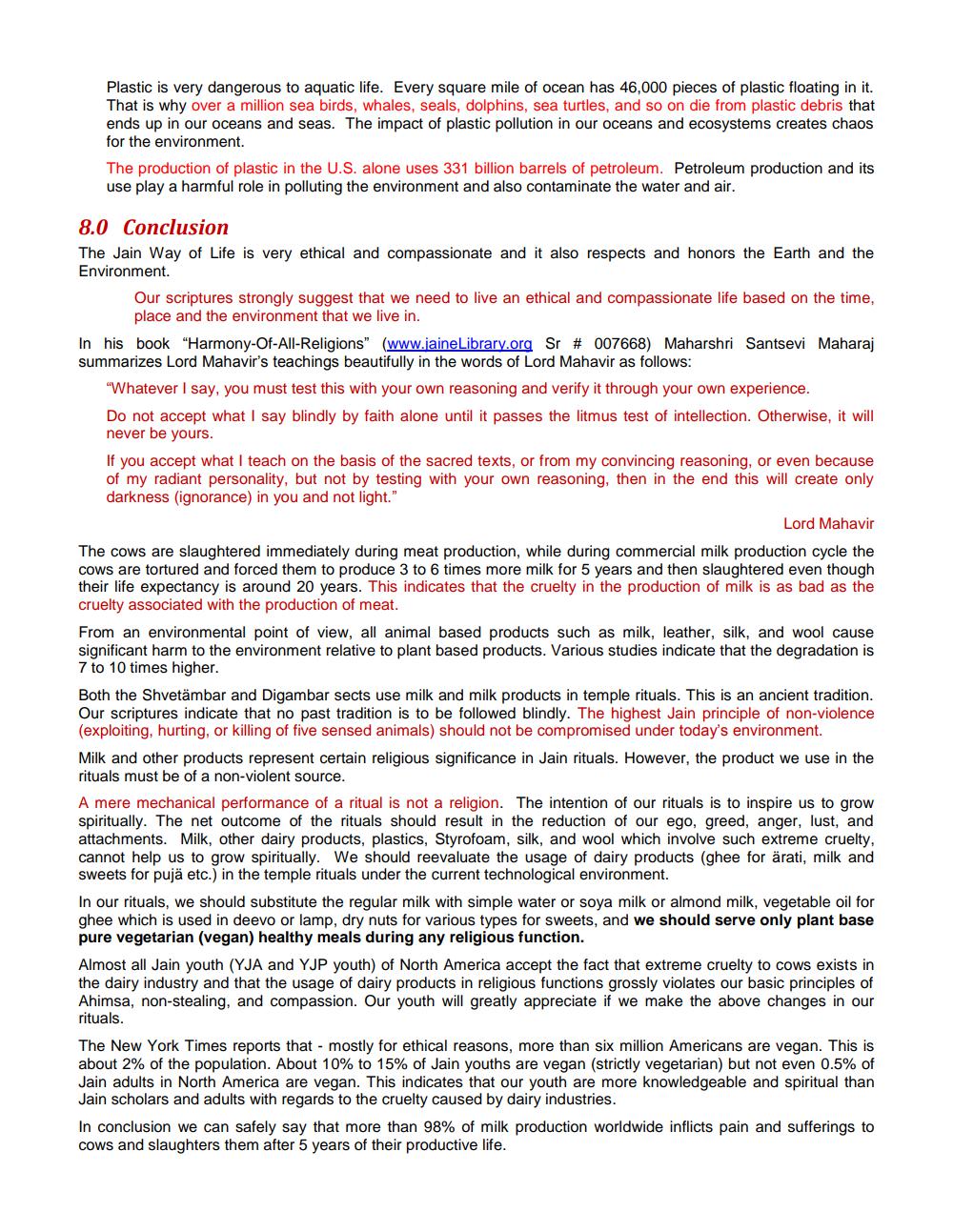Book Title: Contemporary Jain Way of Compassionate Living V1 Author(s): Pravin K Shah Publisher: JAINA Education Committee View full book textPage 6
________________ Plastic is very dangerous to aquatic life. Every square mile of ocean has 46,000 pieces of plastic floating in it. That is why over a million sea birds, whales, seals, dolphins, sea turtles, and so on die from plastic debris that ends up in our oceans and seas. The impact of plastic pollution in our oceans and ecosystems creates chaos for the environment. The production of plastic in the U.S. alone uses 331 billion barrels of petroleum. Petroleum production and its use play a harmful role in polluting the environment and also contaminate the water and air. 8.0 Conclusion The Jain Way of Life is very ethical and compassionate and it also respects and honors the Earth and the Environment. Our scriptures strongly suggest that we need to live an ethical and compassionate life based on the time, place and the environment that we live in. In his book "Harmony-Of-All-Religions" (www.jaine Library.org Sr # 007668) Maharshri Santsevi Maharaj summarizes Lord Mahavir's teachings beautifully in the words of Lord Mahavir as follows: "Whatever I say, you must test this with your own reasoning and verify it through your own experience. Do not accept what I say blindly by faith alone until it passes the litmus test of intellection. Otherwise, it will never be yours. If you accept what I teach on the basis of the sacred texts, or from my convincing reasoning, or even because of my radiant personality, but not by testing with your own reasoning, then in the end this will create only darkness (ignorance) in you and not light." Lord Mahavir The cows are slaughtered immediately during meat production, while during commercial milk production cycle the cows are tortured and forced them to produce 3 to 6 times more milk for 5 years and then slaughtered even though their life expectancy is around 20 years. This indicates that the cruelty in the production of milk is as bad as the cruelty associated with the production of meat From an environmental point of view, all animal based products such as milk, leather, silk, and wool cause significant harm to the environment relative to plant based products. Various studies indicate that the degradation is 7 to 10 times higher. Both the Shvetambar and Digambar sects use milk and milk products in temple rituals. This is an ancient tradition. Our scriptures indicate that no past tradition is to be followed blindly. The highest Jain principle of non-violence (exploiting, hurting, or killing of five sensed animals) should not be compromised under today's environment. Milk and other products represent certain religious significance in Jain rituals. However, the product we use in the rituals must be of a non-violent source. A mere mechanical performance of a ritual is not a religion. The intention of our rituals is to inspire us to grow spiritually. The net outcome of the rituals should result in the reduction of our ego, greed, anger, lust, and attachments. Milk, other dairy products, plastics, Styrofoam, silk, and wool which involve such extreme cruelty, cannot help us to grow spiritually. We should reevaluate the usage of dairy products (ghee for arati, milk and sweets for puja etc.) in the temple rituals under the current technological environment. In our rituals, we should substitute the regular milk with simple water or soya milk or almond milk, vegetable oil for ghee which is used in deevo or lamp, dry nuts for various types for sweets, and we should serve only plant base pure vegetarian (vegan) healthy meals during any religious function. Almost all Jain youth (YJA and YJP youth) of North America accept the fact that extreme cruelty to cows exists in the dairy industry and that the usage of dairy products in religious functions grossly violates our basic principles of Ahimsa, non-stealing, and compassion. Our youth will greatly appreciate if we make the above changes in our rituals. The New York Times reports that - mostly for ethical reasons, more than six million Americans are vegan. This is about 2% of the population. About 10% to 15% of Jain youths are vegan (strictly vegetarian) but not even 0.5% of Jain adults in North America are vegan. This indicates that our youth are more knowledgeable and spiritual than Jain scholars and adults with regards to the cruelty caused by dairy industries. In conclusion we can safely say that more than 98% of milk production worldwide inflicts pain and sufferings to cows and slaughters them after 5 years of their productive life.Page Navigation
1 ... 4 5 6
